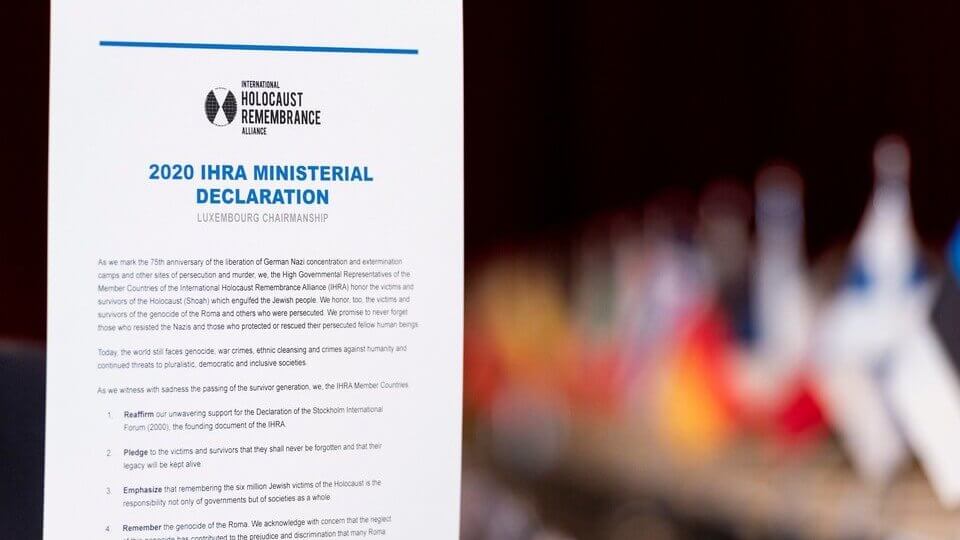Australia/Israel Review
Deconstruction Zone: A defining problem regarding antisemitism
Dec 20, 2020 | Ben Cohen

A group of Palestinian and Arab intellectuals, 122 in all, endorsed a statement published by The Guardian newspaper on Nov. 29 that attacked the International Holocaust Remembrance Alliance’s (IHRA) definition of antisemitism. These intellectuals [including Australian academic Dr. Ghassan Hage – Ed.] were concerned because the definition continues to be adopted by hundreds of governments, local authorities and civic associations in the United States and across the world as an effective instrument for countering the hatred of Jews.
It’s not that these Arab intellectuals endorse antisemitism. They declare early on that “no expression of hatred for Jews as Jews should be tolerated anywhere in the world.” They recognise, too, that antisemitism “manifests itself in sweeping generalizations and stereotypes about Jews, regarding power and money in particular, along with conspiracy theories and Holocaust denial.”
Yet despite featuring the names of some of the Arab world’s most respected academics, writers and filmmakers, the statement on the IHRA definition at no point acknowledges that antisemitism as a social and religious phenomenon is deeply embedded within the Arab civilisations that these intellectuals represent. Instead, antisemitism is depicted as someone else’s problem, primarily Europe’s.
It is hard to take seriously the expressed commitment to fighting antisemitism in this statement in the face of such blatant airbrushing of Middle Eastern history. For millennia, Jews occupied a precarious place in Arab and Islamic societies, occasionally experiencing more benign rulers, but frequently serving as the targets of official discrimination and popular violence.
None of this is apparently relevant to these intellectuals, who see their role as nourishing the national mythologies of the Arab world – specifically, that antisemitism is not an Arab problem and, relatedly, that the problem of antisemitism has been imposed upon the Arabs as a result of European and American backing for Zionism, and the consequent “ethnic cleansing” of the Palestinians during Israel’s War of Independence in 1948.
It is this last claim that gets to the heart of the objection these intellectuals have towards the IHRA definition. Recognising that antisemitism is a dynamic phenomenon, the definition includes as examples both classic tropes about Jews and more modern ones that revolve around Israel and Zionism. Asserting that Jews as a nation have no right to self-determination and depicting the State of Israel as a racist original sin against the Palestinians are, under the terms of the definition, indubitably antisemitic.
Not surprisingly, this grouping of intellectuals is infuriated that the very positions they promote – that Israel is a racist undertaking, that Jews are an invented nation, that Israeli policies towards the Palestinians are a reincarnation of the Nazi persecution of the Jews – are defined as antisemitic, and therefore as morally and politically tainted, by a growing segment of international opinion. But instead of honestly reviewing these positions in light of historical changes, they have simply doubled down on the discredited anti-Zionist campaign that was waged by Arab regimes before Israel even came into existence.
Centrally, they want to establish as an uncontested fact – in exactly the way that the Holocaust or the Cambodian genocide or the Transatlantic slave trade are uncontested facts – the Palestinian claim that Israel’s creation was a nakba (“catastrophe”). “As it currently exists, the state of Israel is based on uprooting the vast majority of the natives – what Palestinians and Arabs refer to as the nakba – and on subjugating those natives who still live on the territory of historical Palestine as either second-class citizens or people under occupation, denying them their right to self-determination,” the statement reads.
Those states and bodies that have endorsed the IHRA definition understand this argument very differently. They do not see it as an objective statement of fact, but as a highly politicised account of the origins, nature and policies of the Jewish state. They do not accept as uncontested the claim that Israel, in the process of establishing its independence, deliberately expelled 750,000 Palestinian Arabs, or that Israel is solely responsible for the perpetuation of the refugee question almost 80 years on.
Indeed, partly because of the IHRA definition’s spread, a growing number of opinion-shapers are beginning to understand that the anti-Zionist explanation for the plight of the Palestinians is itself built upon an antisemitic caricature of the Zionist undertaking.
As the strategic significance of the Palestinian issue has receded over the last few years, the use of the nakba as a narrative to undermine both the Jewish claim to national self-determination and the fight against antisemitism in its anti-Zionist guise is becoming less and less effective. In time, perhaps, some Arab intellectuals will realise that this development was, above all, a stroke of good fortune for the Palestinians, helping to liberate them from their damaging shibboleths towards a life of peace and looking forward.
Ben Cohen is a New York City-based journalist and author. © Jewish News Syndicate (JNS.org), reprinted by permission, all rights reserved.
Tags: Anti-Zionism, Antisemitism






